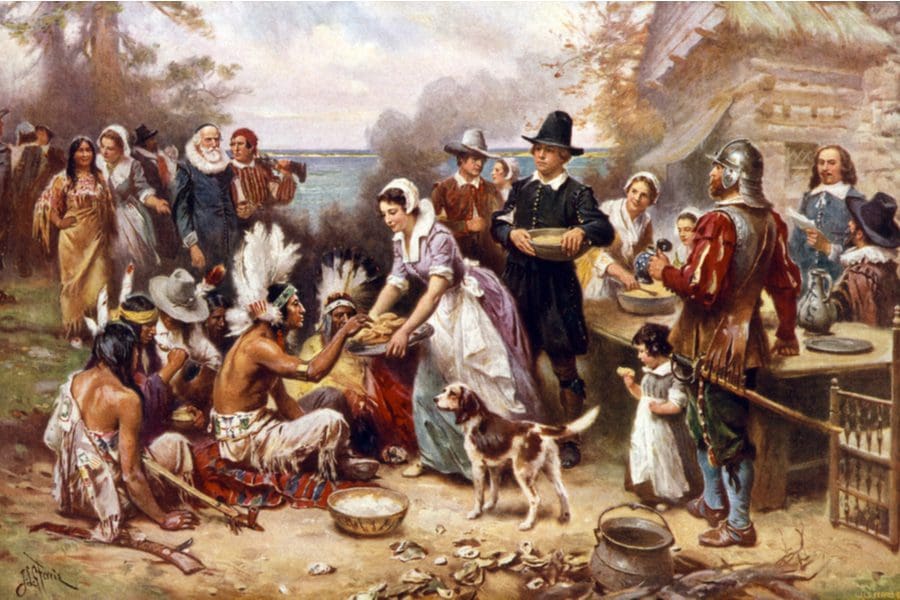It happens with a lot of holidays. Over the years, things become a bit commercialized, a bit distilled, and a bit modernized. And while we’re all for creating traditions, enjoying our loved ones, and bringing history into the now, we should always acknowledge where these traditions began. Because, as much as we’d like for it to be, it’s not all about turkey and mashed potatoes.
It’s true, in 1621, the colonists shared a 3 day meal with the Native Americans, which has now transformed into the national holiday of Thanksgiving (thanks to Abraham Lincoln in 1863). And while we remember that day as a moment of community and peace between the pilgrims and Native Americans, there’s a sordid bit of history that accompanies that meal. Let’s start from the beginning.
In 1620, a group of people seeking religious freedom boarded the Mayflower and left England in search of a new home where they could freely practice their religious beliefs and own new land. The ship left with 102 passengers and set sail on a 66-day voyage that was marked as difficult and treacherous. The Pilgrims, as we now call them, ultimately ended their journey after crossing the Massachusetts Bay and began work on establishing their new home of Plymouth.
After a brutal winter still spent aboard the ship, the surviving Pilgrims moved ashore and were greeted by Native Americans. The Native Americans treated the malnourished Pilgrims with kindness and hospitality. The Native Americans taught them how to farm corn, fish, decipher edible plants, and most importantly, was able to help the Pilgrims establish an alliance with the Wampanoag tribe—creating a harmonious setting. However, this moment of peace didn’t last forever.
After what we deem the first Thanksgiving, more and more English settlers began colonizing and stripping the Native Americans of their land. In addition to this, the colonists brought over disease and illness that ravaged the Native American population. By 1675, The New England Confederation of Colonies declared war on the local Native American tribes, and any sing of peace had vanished. Over the course of King Phillip’s war from 1675-1678, approximately 3,000 Indians had been killed and their crops were ruined. Members of the Wampanoag and allied tribes were forced out of their villages to seek new homes.
To put it into perspective, in an article originally published in The Historical Journal of Massachusetts, Robert E. Cray Jr., a Montclair State University professor, notes that the overall death toll may have been as high as 30% of the English population and nearly 50% of the Native Americans inhabiting New England. And this was just one instance of war between the Native American and colonial settlers. The bloody battles went on for years to come, uprooting the Native Americans from their original homes all across the East Coast.
More recently, people are confronting these historical truths and rethinking the way we celebrate Thanksgiving. And in 2020 particularly, we’re focusing on social justice and the disproportionate effect of the pandemic on people of color. The history of Thanksgiving isn’t only in the past, it just looks a bit different in the present. While you partake in your Thanksgiving traditions this week, take a moment to remember why this holiday exists, the people who died and lost their land in the name of colonization, and how we see this attitude still present itself in the present day.






